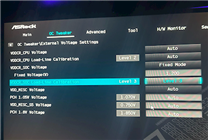ASRock has launched a new firmware, version 3.40, for its AMD 800 series motherboards, aimed at enhancing CPU operation stability. This release comes in response to issues with AM5 slots experiencing burn-in problems. The update is reported to improve memory compatibility and system stability, although it remains unclear if it completely resolves the Ryzen processor burn-in issue.
According to Fast Technology’s report on August 29, the timing of this firmware update suggests a connection to these recent concerns. Tom’s Hardware highlights that detailed update logs are unavailable, but users on Reddit have noted that the new firmware appears to lower voltage values associated with various processes.
Specifically, the BIOS version 3.40 has set the SoC voltage (VDDCR_SOC) to 1.2V. This voltage is crucial for controlling the power supplied to various processor I/O components, like memory controllers and PCIe channels, especially when overclocking. While no official safety value for SoC voltage exists, AMD’s AGESA code limits it to 1.3V, making 1.2V a safer level for daily use.
Additionally, this update adjusts the LLC (Load Line Calibration) level of SoC voltage to 3, previously set to automatic. LLC helps stabilize CPU supply voltage under different loads, compensating for voltage fluctuations, particularly the “V-droop” issue. By doing so, the CPU’s actual operating voltage remains close to the target set in the BIOS. This adjustment is significant, as automatic settings can sometimes lead to CPU damage from excessive voltage increases.
Overall, industry experts recommend that users of ASRock AMD 800 series motherboards update to this latest BIOS version and monitor its effects. This advice follows the clarification provided by AMD regarding the burn-in issues. AMD identified that some motherboard manufacturers had not adhered to their official BIOS guidelines, leading to CPUs exceeding their default specifications through modifications in voltage and power limits.
Earlier in the year, reports surfaced about Ryzen 7 9800X3D failures, predominantly affecting users with ASRock motherboards. AMD has assured that they are working closely with partners to address these complexities and advises users to update to the latest BIOS version to mitigate these problems.
In conclusion, ASRock’s new firmware update is a crucial step in enhancing CPU operation stability and addressing the AM5 slot burn crisis. Users are encouraged to adopt this update to ensure better performance and reduced risk of hardware issues.
Source link








